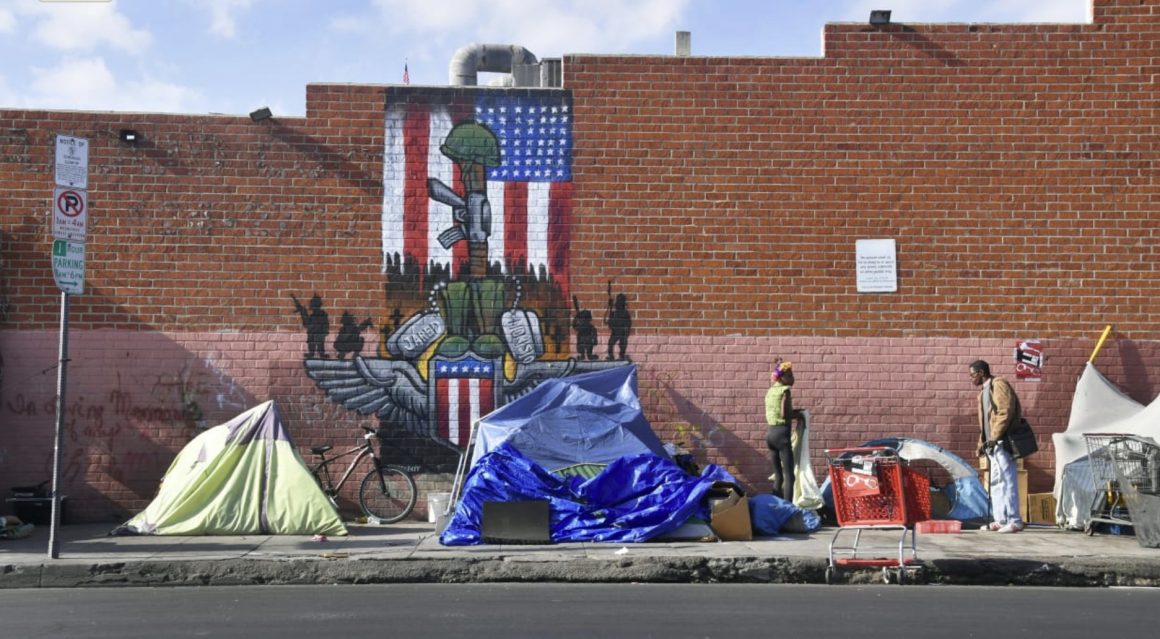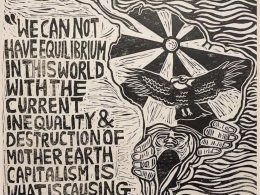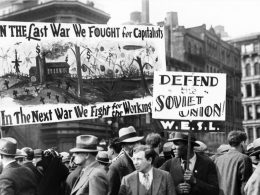This country is falling apart. Malnutrition, evictions, unemployment, and other symptoms of civilizational decay have all accelerated since the pandemic started, and it’s apparent from looking at our deteriorating urban landscapes. Lenin wrote about how capitalism in the age of parasitic imperial extraction is a rotting capitalism, exhausted in its internal virility and now having to rely on stealing from the exploited world. He observed how even a century ago, this decay of the core imperialist countries was apparent within the borders of established colonial powers like Britain and Germany. Now that the U.S. empire has entered into its own process of global collapse, one that can’t be reversed or compensated for by displacing the core imperial role onto a different ountry, it can only contract. Its ruling class can only sacrifice ever more of its own population to delay the system’s full unraveling.
What this looks like is an environment where less and less people are able to afford housing, or feed their families, or have any sort of livelihood. The lumpenproletariat, the class that’s been displaced by capitalism and pressured into choosing crime or other non-proletarian work to survive, is growing. And many aren’t even lucky enough to become lumpen, instead simply being reduced to panhandlers. The inflation crisis, exacerbated by the latest war Washington has engineered to try to restore its fading geopolitical dominance, is working to break an already strained working class. And the ruling class are glad that this is happening. Bank of America recently concluded that it’s preferable from a business perspective for the conditions of American workers to get worse, because this would make more people feel desperate enough to accept jobs within our poor workplace conditions.
As our police state has been getting more militarized, and more unarmed Black men have been getting murdered, the most disenfranchised communities have been rising up. In Minneapolis, the zone surrounding George Floyd Square hasn’t simply returned to normal under a new label. The racial tensions have been simmering since the riots, the police deciding to leave this section of the city alone as Black residents walk around on the lookout for more white supremacist violence. The cops don’t want their station to get burnt down again. This de facto autonomous zone that the African nation has created is a victory for the decolonial liberation struggle, but the area is still subject to the ravaging influences of neoliberal capitalism. Poverty, crime, and urban decay have been getting worse there like in every other city, and private mercenaries have been swooping in to establish bases for carrying out unaccountable paramilitary violence. The cops have had their patrolling range reduced by the uprising, but military contractors have used the riots as an excuse to become proxies for law enforcement.
Parallel stories can be found across the rest of the country, though domestic policing mercenaries haven’t yet spread outside their starting point of Minneapolis. Los Angeles has been getting even more wrought with homelessness, drugs, and petty theft. Gangs, both the lumpen kinds and the ones that exist within the police departments themselves, are taking advantage of this chaos, whether to recruit or to find excuses for more racial state violence. The law enforcement type of gang makes the lumpen type possible. The gangs within marginalized communities are desperate, last ditch responses to the conditions under capitalism and colonialism, an effort by oppressed groups to gain autonomy when their government seeks to deprive them of autonomy. The tragedy of this dynamic is that the gangs reinforce the violence, drug addiction, and disunity within these communities. The school to prison pipeline often then leads impoverished young men into joining gangs, which are quasi-military governments that themselves depend on the black markets capitalism creates.
This is the cycle of destabilization and crime-filled power vacuums that’s being expanded in its prevalence as capitalism continues to eat itself. The substance abuse, mental illness, domestic violence, and inner city bloodshed that these communities increasingly experience are products of a socioeconomic system in decline. The police state, which continues to receive growing amounts of funds in parallel to the military, justifies its atrocities by pointing to these social ills. But the problems within our communities exist because of capitalism, not in spite of it. No amount of trying to clean out crime under capitalism will solve the problem, it will only get worse for as long as the ruling class remains in power.
When we understand this self-reinforcing nature of the current social order, in which the police gangs help prop up the street gangs, in which poverty creates crime and crime helps reinforce poverty, in which capitalism cultivates community division and community division keeps capitalism alive, we can grasp the ideological framework necessary for carrying out revolution. This is a framework in which we choose to break the cycle of destruction that capitalism depends on. When Marx and Engels warned that the lumpenproletariat is incompatible with revolutionary struggle, and that its detachment from the means of production makes it at risk of joining the forces of reactionary intrigue, they were correct on this point in itself. But what they didn’t mention about the lumpen, and what the Black Panthers then went on to add to the essential elements of Marxist theory, is that criminal or jobless individuals can be brought into the revolution. The fact that growing amounts of the population are being pushed to the margins by capitalism doesn’t mean the population’s revolutionary potential is shrinking. It means that if we build community aid and defense networks, as the Panthers did, we’ll be able to lift these desperate individuals out of their circumstances and get them into the right place for revolutionary organizing.
This doesn’t mean merely demanding change on the part of the people without doing any work ourselves. It means sacrifices on the part of us organizers, sacrifices that will be needed to protect marginalized communities from the violence which threatens them. In other words, we must act as the people’s servants. Addressing the people’s practical material needs is just one part of it; another part is providing the defense tools that will be needed for protecting individuals who want to join the struggle, but who don’t currently feel safe to because of their circumstances. Such as former gang members, or gang members who wish they could leave without getting murdered.
I’ve stated, based on opinions from people I’ve talked to who used to be part of the gang lifestyle, that no active or semi-active gang member should be allowed into organizing. But that doesn’t mean I won’t put my body at risk if that’s what it may one day take to make someone from that world safe enough to leave it. The perspectives on the lumpen from Marx and Engels were my starting point on how to respond to our increasingly crime-heavy conditions. The perspectives of the Panthers have served to expand my thinking so that I’m now more compassionate and generous to those under such circumstances.
If we engage with the people while having this mindset, if we recognize that the destructive ways in which people often respond to their conditions can be ended if our socioeconomic inequalities are rectified, we’ll get the masses on the side of revolution. And that’s not to reduce our society’s issues to class. We don’t just need a universal jobs progran, there’s also the need to pay repatriations to those who’ve been harmed by both capitalism and colonialism, the need for mass mental healthcare for the many people who’ve been traumatized by living in violent neighborhoods, the need for educational programs that combat racist, socially reactionary, and patriarchal thinking patterns. The damage caused by our social order runs deep. To begin to undo it, we must not fetishize gangs, drugs, or violence, but examine which needs within our communities have to be addressed.—————————————————————————
If you appreciate my work, I hope you become a one-time or regular donor to my Patreon account. Like most of us, I’m feeling the economic pinch during late-stage capitalism, and I need money to keep fighting for a new system that works for all of us. Go to my Patreon here.








